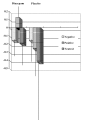Differential effects of acute diazepam on emotional and neutral memory tasks in acutely hospitalized depressed patients
- PMID: 18568105
- PMCID: PMC2416758
Differential effects of acute diazepam on emotional and neutral memory tasks in acutely hospitalized depressed patients
Abstract
With the hypothesis that depression affects memory through a mechanism other than that of the benzodiazepines, the present study evaluated the acute effect of diazepam 10 mg upon explicit memory in patients with major depression. A double-blind, placebo (starch 50 mg) controlled experiment was carried out with 19 patients randomly divided into diazepam (n = 10) and placebo (n = 9) groups. They were evaluated by the Mini-Mental State Examination, and tests were conducted for immediate and delayed (short-term) memory with emotionally toned stimuli (negative, positive, neutral), recognition, and semantic memory in visual or auditory modality. The Visual Analog Mood scale (VAMS) was applied to measure anxiety and mood changes after the administration of drugs (30 minutes and 6 hours). Higher scores in the positively toned list among patients who received diazepam were observed, at the 30-minute compared with the 6-hour evaluation. The recall index of positive words in the diazepam group was positive and significantly different from the index of the placebo group. No anterograde amnesia following diazepam was observed. The neural model of a dysfunction of limbic prefrontal cortical structures that impairs the modulation of the amygdala in major depression may explain the present results. Consequently, the action of diazepam on the amygdala, which has been proposed to be the basis of its anxiolytic action, might be altered, modifying the modulation of memory in our patients.
Keywords: amygdala; diazepam; emotional memory tasks; major depression.
Figures
Similar articles
-
Effects of single oral doses of clobazam, diazepam and lorazepam on performance tasks and memory.Eur J Clin Pharmacol. 1987;32(5):461-6. doi: 10.1007/BF00637670. Eur J Clin Pharmacol. 1987. PMID: 2887431 Clinical Trial.
-
The effect of anxiolytic drugs on memory in anxious subjects.Psychopharmacol Ser. 1988;6:128-39. doi: 10.1007/978-3-642-73288-1_9. Psychopharmacol Ser. 1988. PMID: 2905803 Clinical Trial.
-
Diazepam and memory: evidence for spared memory function.Pharmacol Biochem Behav. 1987 Nov;28(3):347-52. doi: 10.1016/0091-3057(87)90451-5. Pharmacol Biochem Behav. 1987. PMID: 3685069 Clinical Trial.
-
Localization in the amygdala of the amnestic action of diazepam on emotional memory.Behav Brain Res. 1993 Dec 20;58(1-2):99-105. doi: 10.1016/0166-4328(93)90094-7. Behav Brain Res. 1993. PMID: 8136053 Review.
-
Memory distortion for orthographically associated words in individuals with depressive symptoms.Cognition. 2020 Oct;203:104330. doi: 10.1016/j.cognition.2020.104330. Epub 2020 Jun 18. Cognition. 2020. PMID: 32563733 Review.
Cited by
-
Memory mood congruency phenomenon in bipolar I disorder and major depression disorder patients.Braz J Med Biol Res. 2012 Sep;45(9):856-61. doi: 10.1590/s0100-879x2012007500098. Epub 2012 Jun 21. Braz J Med Biol Res. 2012. PMID: 22714812 Free PMC article.
References
-
- Ammassari-Teule M, Pavone F, Castellano C, et al. Amygdala and dorsal hippocampus lesion block the effect of GABAergic drugs on memory storage. Brain Res. 1991;551:104–9. - PubMed
-
- Angst J. Major depression in 1998: are we providing optimal therapy? J Clin Psychiatry. 1999;60:VI-5–9. - PubMed
-
- Barros DM, Izquierdo LA, Sant-Anna MK, et al. Stimulators of cAMP cascade reverse amnesia induced by intra-amygdala but not intrahippocampal KN-62 administration. Neurobiol Learn Memory. 1999;71:94–103. - PubMed
-
- Bianchin M, Mello-e-Souza T, Medina JH, et al. The amygdala is involved in the modulation of long-term memory but not in working or short-term memory. Neurobiol Learn Memory. 1999;71:127–31. - PubMed
-
- Breen RA, McGaugh J. Facilitation of maze learning with posttrial injections of picrotoxin. J Fr Med Chir Thorac. 1961;54:498–501. - PubMed
LinkOut - more resources
Full Text Sources


